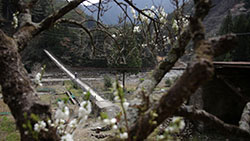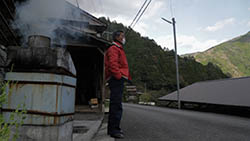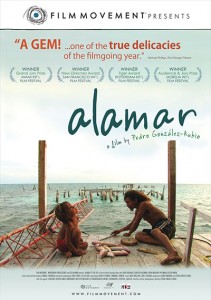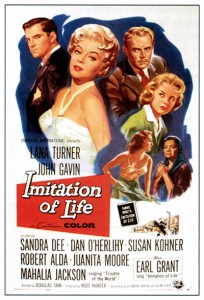Alamar
1:00 p.m. Bijou Art Cinemas
Tickets: $6 all
 Jorge and Roberta have been separated for several years. They simply come from opposite worlds: he likes an uncomplicated life in the jungle, while she prefers a more urban existence. He is Mexican and she is Italian, and she has decided to return to Rome with their five-year-old son, Natan. But before they leave, Jorge, hoping to teach young Natan about his Mayan origins, takes him to the pristine Chinchorro reef and eases him into the rhythms of a fisherman’s life. At first the boy is physically and emotionally uncomfortable with the whole affair, and gets seasick on the boat taking them to their destination. But as father and son spend more time together, Natan begins a learning experience that will remain with him forever.
Jorge and Roberta have been separated for several years. They simply come from opposite worlds: he likes an uncomplicated life in the jungle, while she prefers a more urban existence. He is Mexican and she is Italian, and she has decided to return to Rome with their five-year-old son, Natan. But before they leave, Jorge, hoping to teach young Natan about his Mayan origins, takes him to the pristine Chinchorro reef and eases him into the rhythms of a fisherman’s life. At first the boy is physically and emotionally uncomfortable with the whole affair, and gets seasick on the boat taking them to their destination. But as father and son spend more time together, Natan begins a learning experience that will remain with him forever.
 Filmmaker Pedro González-Rubio crafted a beautiful, organic, visceral, and visual experience with Alamar (aka To The Sea), his first solo directorial credit. This semi-documentary, in the spirit of Robert Flaherty, makes every shot a memorable composition of elegant cinematography and perceptive observation. The New York Times’ Stephen Holden writes: “The characters in Alamar may be playing versions of themselves, but the writer, editor, and director Pedro González-Rubio has constructed a film in which the journey has an overarching mythic resonance that evokes fables from Robinson Crusoe to The Old Man and the Sea.”
Filmmaker Pedro González-Rubio crafted a beautiful, organic, visceral, and visual experience with Alamar (aka To The Sea), his first solo directorial credit. This semi-documentary, in the spirit of Robert Flaherty, makes every shot a memorable composition of elegant cinematography and perceptive observation. The New York Times’ Stephen Holden writes: “The characters in Alamar may be playing versions of themselves, but the writer, editor, and director Pedro González-Rubio has constructed a film in which the journey has an overarching mythic resonance that evokes fables from Robinson Crusoe to The Old Man and the Sea.”
ARTIST TALK AND LIVE PERFORMANCE: MING WONG
2:00 p.m. Jordan Schnitzer Museum of Art Lecture Room and White Stag Building, Portland FREE
 Artist Ming Wong will visit Eugene and Portland via live video to give an artist’s talk and live performance in conjunction with his two-city exhibition, Emotion Pictures. Wong has been recognized internationally for his ambitious performance and video works that engage with the history of world cinema. Working through the visual styles and tropes of such iconic film directors as Rainer Werner Fassbinder, Wong Kar-wai, and Ingmar Bergman, Wong’s practice considers the means through which subjectivity and geographic location are constructed by motion pictures.
Artist Ming Wong will visit Eugene and Portland via live video to give an artist’s talk and live performance in conjunction with his two-city exhibition, Emotion Pictures. Wong has been recognized internationally for his ambitious performance and video works that engage with the history of world cinema. Working through the visual styles and tropes of such iconic film directors as Rainer Werner Fassbinder, Wong Kar-wai, and Ingmar Bergman, Wong’s practice considers the means through which subjectivity and geographic location are constructed by motion pictures.
At the Jordan Schnitzer Museum of Art, from April 12 through June 2, Wong is showing Life and Death in Venice, a revisiting of Luchino Visconti’s 1971 film version of Thomas Mann’s Death in Venice. On opposite screens the artist performs the roles of both the aging composer/writer Gustav von Aschenbach, and Tadzio, the adolescent boy whose uncorrupted youth and beauty mirrors the older man’s state of crisis and impending death. In the White Box Gallery in Portland (April 4–May 4, 2013), Wong is showing Life of Imitation, a looped 13-minute double-channel installation. Originally commissioned for the 53rd Venice Biennale Singapore Pavilion, this work is inspired by the classic Hollywood melodrama Imitation of Life, where a black mother meets her mixed-race daughter who has been running away from her true “identity.” Wong’s version features three male actors from the main ethnic groups in Singapore (Chinese, Malay, and Indian) taking turns to play the black mother and her “white” daughter.
IMITATION of Life
4:00 p.m. NW Film Center Whitsell Auditorium, Portland Art Museum
 Though deemed a “soap opera” and a “women’s picture” by the critics upon its original release, Imitation of Life (1959) today is held up as a masterpiece of Douglas Sirk’s directing style.
Though deemed a “soap opera” and a “women’s picture” by the critics upon its original release, Imitation of Life (1959) today is held up as a masterpiece of Douglas Sirk’s directing style.
Lana Turner plays Lora, a single white mother whose Hollywood stardom ambitions come at the expense of any meaningful relationship with her daughter, Susie (Sandra Dee). Lora’s black housekeeper, Annie (Juanita Moore), has troubles of her own as she faces the rejection of her own fair-skinned daughter, Sarah Jane (Susan Kohner), who abandons her heritage for a chance to be accepted as white. As years of selfishness and denial pass, tragedy strikes and forces the women to come to terms with their own identities. Imitation of Life portrays the searing paradox and despair of racism in America, and the self-hatred it promotes. Both Kohner and Moore earned Academy Award nominations for their stirring and spectacular performances.
Inori
4:00 p.m. Bijou Art Cinemas
Tickets: $6 all
![]()

Japan, 2012
Directed by Pedro González-Rubio
Screenplay by Pedro González-Rubio
Cinematography by Pedro González-Rubio
Editing by Pedro González-Rubio
Music by Aldo Arechar
Running Time: 71 minutes
 Emerging Mexican documentary filmmaker Pedro Conzález-Rubio, director of the acclaimed Mexican documentary Alamar, creates another visually stunning and tranquil piece. Fans of Alamar will find gentle pleasures in yet another colorful portrayal of nature’s transcendent beauty.
Emerging Mexican documentary filmmaker Pedro Conzález-Rubio, director of the acclaimed Mexican documentary Alamar, creates another visually stunning and tranquil piece. Fans of Alamar will find gentle pleasures in yet another colorful portrayal of nature’s transcendent beauty.
Gonzalez-Rubio was inspired by the natural wonders and the inevitable melancholy faced by the aging population of a dying town in the lush, water-fed mountains of Japan’s southeastern Nara Prefecture. Through González-Rubio’s curious and empathetic outsider’s gaze, each villager becomes a fascinating character that is never alien and always extraordinary. With the forestry industry dying and younger generations abandoning the jobless countryside for the cities, this once-bustling community has largely been left to the elderly, where the few remaining residents go about their daily routines with an inescapable sense of the town’s mortality and their own.
 Winner of Best Documentary at the Morelia Film Festival, Inori was cited by IndieWire’s Erick Kohn as one of the top ten undistributed films of 2012: “Pedro González-Rubio’s tender look at the handful of aging residents in a remote village hidden deep within a lush forest is one of the saddest, most poignant snapshots of mortality in recent memory.”
Winner of Best Documentary at the Morelia Film Festival, Inori was cited by IndieWire’s Erick Kohn as one of the top ten undistributed films of 2012: “Pedro González-Rubio’s tender look at the handful of aging residents in a remote village hidden deep within a lush forest is one of the saddest, most poignant snapshots of mortality in recent memory.”

